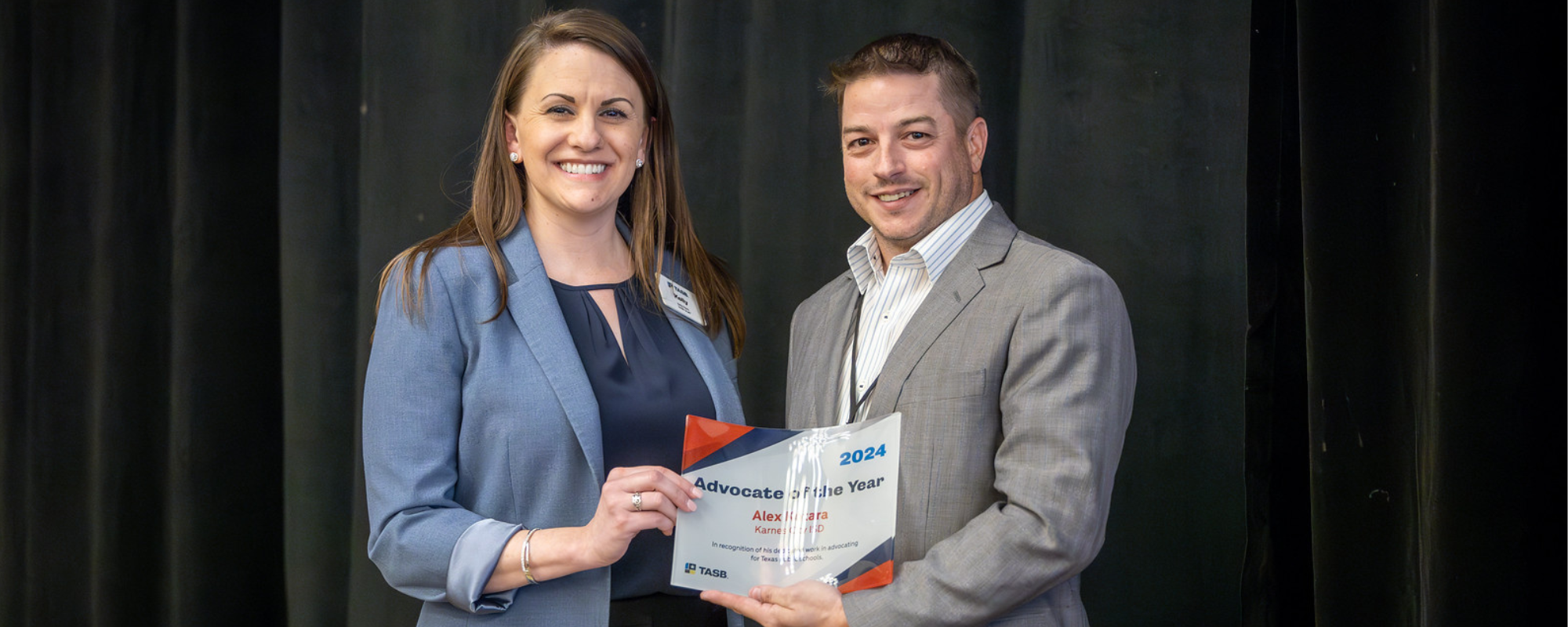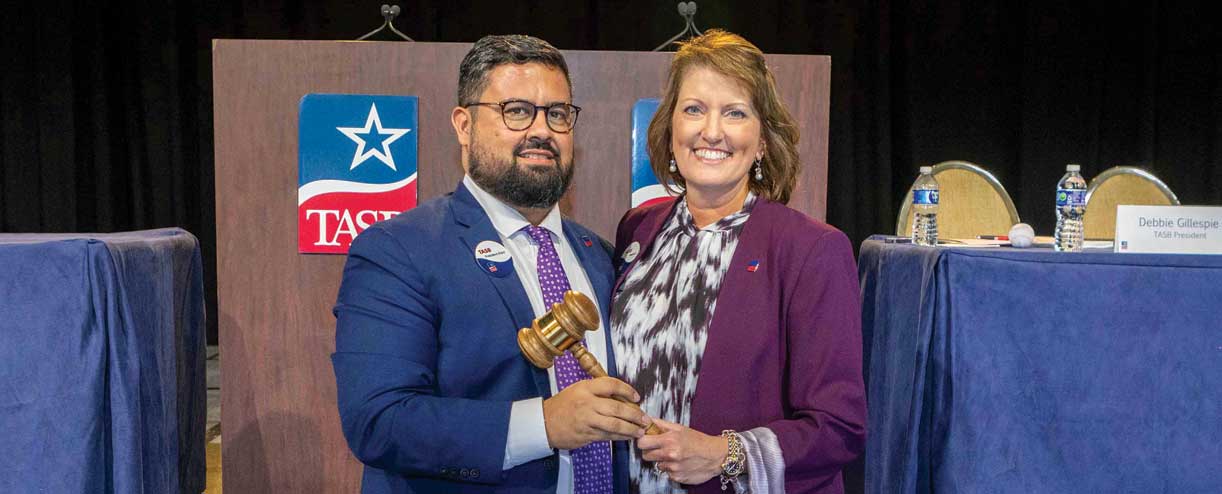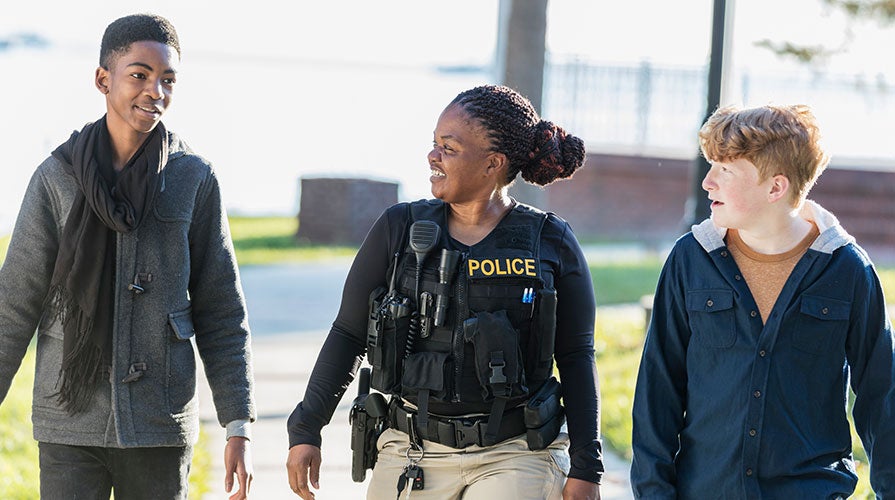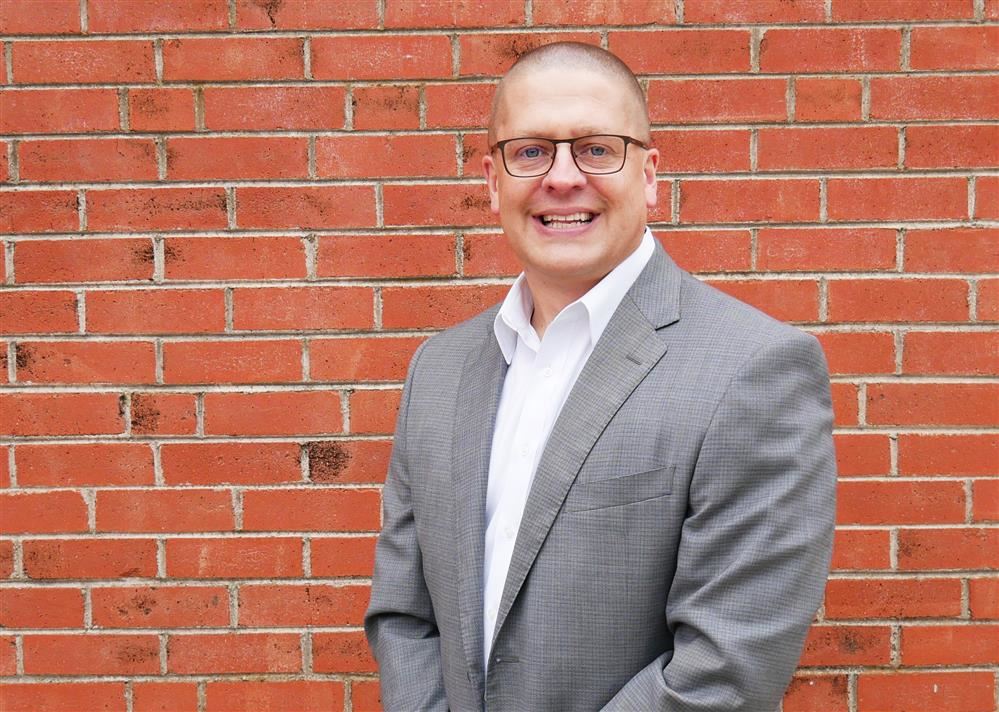2023-24 Advocate of the Year
Alex Kotara has been serving others for much of his adult life, well before he became a trustee for his hometown district of Karnes City ISD — and TASB’s 2023-24 Advocate of the Year.
After graduating high school in 1997 and then attending Texas A&M University, Kotara’s life of service took off when he joined the Marine Corps. He spent the next 10 years as an infantry assaultman deployed to Iraq and Afghanistan before transitioning to a role as an air traffic controller. This next career phase would lead Kotara to help provide humanitarian aid and disaster recovery work in Japan, Thailand, the Philippines, and Nepal.
Kotara moved back to South Texas in 2016 to settle down with family, where he is now a member of several charity and service organizations, and the Karnes City ISD Board of Trustees. Just as he once served his country, Kotara now serves the school district in the South Texas town he is proud to call home.
Kotara was named Advocate of the Year at txEDCON24, where the award has been presented annually since 2021. This honor recognizes trustees who go above and beyond to speak up strongly for Texas public schools.
“Alex is a tremendous advocate for the students of Karnes City and those across Texas,” said Dax González, division director of TASB Governmental Relations. “He has worked at the local, state, and federal levels to improve educational outcomes for children with his common-sense approach to advocacy and has brought others along with him.”
Texas Lone Star talked to Kotara about his efforts to advocate for public education in Texas.
Q: What got you into advocating for Texas public schools and your district?
In the Marine Corps, we had a term known as ‘voluntold’— basically, you’re being volunteered by somebody else. My getting involved was kind of like that. It was almost an accident, to be honest. But at the end of the day, being voluntold is about how you embrace what you’re doing.
A couple years ago when I was starting out, I went up to San Antonio for a Grassroots Meeting, not really knowing what to expect, and I ran into Rolinda Schmidt, who was the Region 20 director at the time. We started talking, and she said I needed to run for the Legislative Advisory Council, which I knew nothing about. I threw my name into the hat for my region and talked my way into it, and then went to my first LAC meeting the following April. As I started working with the rest of the LAC through wordsmithing and agenda building processes, I realized it was something I found really interesting and worthwhile.
Q: What’s been your biggest highlight these past few years in your advocacy work?
One of the biggest things for me has been continuing to build and develop a strong relationship with my congresswoman, Rep. Monica De La Cruz. I first came into contact with her office two years ago while working on an issue that would affect the Foundation School Program and the state’s Bond Guarantee Program for school districts. It needed to be addressed at the federal level, so on a Friday afternoon, I reached out to her office through someone I knew on her staff, and by the following Monday morning, she had signed onto federal legislation to address the issue.
This demonstrated how few people it actually takes to keep things moving and how simple the advocacy process can be. Getting in there and seeing how quickly things can get done when people really push is what sold me on doing this work.
Q: What are your approaches to advocacy?
I view my approach to advocacy as pragmatic. I think oftentimes, within the political process, people end up voting against their own interests. This is why grassroots efforts are important. You can’t just blanket sweep a commercial out there to hit everyone in the county and in 10 seconds give them a tagline to hang on to. You really have to get out there in the community and make sure people understand these issues and the impact on their lives. It can be an uphill battle because education takes time, but you just have to show people the common sense of the things they’re voting for or against.
Q: What advice do you have for other trustees who want to up their advocacy efforts?
It’s easy to get involved, so just jump in. In today’s age of technology and information flow, it doesn’t take an act of Congress to meet with your congressperson, representative, or state senator. They’re very approachable. Not only that, but all our state’s legislative hearings are broadcast and are easy to tune in to. You can watch the streams online and keep tabs on the agendas as they’re posted. It’ll make you more aware of what’s going on and where we need to be working. There are always groups out there to get involved in — like the School Board Advocacy Network, Texans for Public Education, and Raise Your Hand Texas — that might align with what you’re advocating for. Join these groups and let them do some of the legwork for you in arranging meetings with lawmakers and other advocates.
Q: Why do you think advocating is important and what do you enjoy about it?
I grew up in a small community where I was very involved early on in things that were service- minded, which then led to a career in the Marine Corps. I’ve always taken more enjoyment out of doing things for others, and serving my district falls in line with that. It takes somebody to speak up and do the work on behalf of our schools, but the public education community has a hard time doing that. Our teachers and administrators are full-time employees, and you also don’t want to pull kids out of classrooms; the advocacy shouldn’t fall to them. Being a trustee is a volunteer position, and when you do the work, you’re doing it on behalf of something greater. We advocate for our schools, so they don’t have to. It brings me a little bit of pride in doing the work, and a whole lot more pride in seeing the effects it has on our schoolchildren and communities.

Matt Mitchell
Matt Mitchell serves as senior communications specialist for the Communications, Marketing, and Events team. He contributes to TASB.org and Texas Lone Star magazine, hosts the TABS Talks podcast, and creates and manages content for TASB social media.
Mitchell previously served as a communications specialist at The University of Texas at Austin, where he focused on internal communications and staff-focused content for the web. He also previously worked for KXAN-TV as social media manager, where he managed the station’s daily social media content and long-form marketing campaigns.
Mitchell is a graduate of Oklahoma State University, where he received both his bachelor’s and master’s degrees.





